

Share
29th April 2019
07:47pm BST

 While he reminded them that anything could happen in football - as a wild first half in the second leg against the tournament favourites had indicated - Pochettino believed they could get over the line.
Tottenham were a half and plenty of sweat yet away from securing their place in the final four of the European Cup for the first time in 57 years and just the second occasion overall.
Briefly, the realisation of how far they’ve come under the Argentine’s watch and specifically in this campaign circled the room.
While he reminded them that anything could happen in football - as a wild first half in the second leg against the tournament favourites had indicated - Pochettino believed they could get over the line.
Tottenham were a half and plenty of sweat yet away from securing their place in the final four of the European Cup for the first time in 57 years and just the second occasion overall.
Briefly, the realisation of how far they’ve come under the Argentine’s watch and specifically in this campaign circled the room.
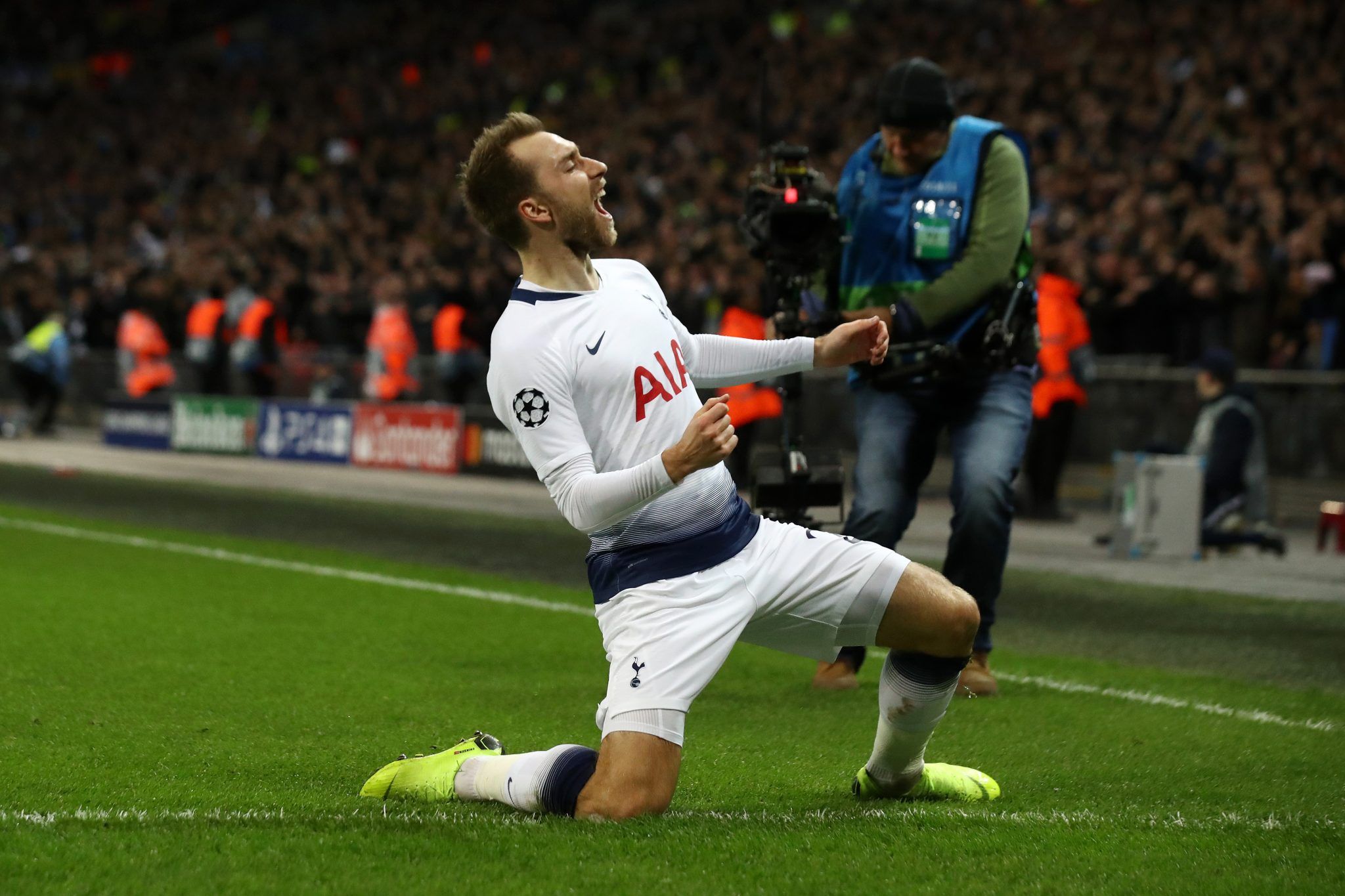 As they attempted to navigate their European ambitions on an upward curve, the bulletin the 47-year-old drilled around Hotspur Way was that there was more than enough to build on: the squad’s attitude and underlying statistics were promising.
With greater mistake management and focus, especially in the final stanza of games, he preached that Tottenham would advance out of the group.
At home against PSV in November, Spurs shifted from conceding late to doing their own damage in the closing stages with a Kane double in 11 minutes to nullify Luuk de Jong’s opener just 120 seconds after kick off.
Afterwards, Pochettino publicly repeated the messaging he had spread privately. "We deserved more in Milan against Inter. We played better than them and were unlucky in the situations we conceded,” he said.
“I am optimistic. If we beat them, the percentage of being in the next stage will be higher. Two games to play. If we are capable of beating Inter, we’ll be on seven points and seven points. Then we are going to go to Barcelona and try to win the game. We are confident.
“This team is growing up. The team is fighting so I am so happy. We tried to fight. We have the character of never giving up which is so important. I am happy always with the situation. We kept pushing and that victory is so important."
Spurs did indeed beat Inter courtesy of an Eriksen winner after fine work by Moussa Sissoko and Dele Alli.
At Camp Nou, Ousmane Dembele made Tottenham’s task even more mountainous by scoring inside seven minutes, but Pochettino was a picture of calm on the touchline.
At half-time, he was sure the outcome would be positive given the quality of chances they were creating and transmitted that confidence to his players. He believed, but more importantly, he needed them to.
Finally, on 85 minutes, Lucas Moura delivered the equaliser: a goal born from Tottenham’s blueprint of constructing from the back just 90 seconds after Coutinho had struck the post at the other end of the pitch.
As they attempted to navigate their European ambitions on an upward curve, the bulletin the 47-year-old drilled around Hotspur Way was that there was more than enough to build on: the squad’s attitude and underlying statistics were promising.
With greater mistake management and focus, especially in the final stanza of games, he preached that Tottenham would advance out of the group.
At home against PSV in November, Spurs shifted from conceding late to doing their own damage in the closing stages with a Kane double in 11 minutes to nullify Luuk de Jong’s opener just 120 seconds after kick off.
Afterwards, Pochettino publicly repeated the messaging he had spread privately. "We deserved more in Milan against Inter. We played better than them and were unlucky in the situations we conceded,” he said.
“I am optimistic. If we beat them, the percentage of being in the next stage will be higher. Two games to play. If we are capable of beating Inter, we’ll be on seven points and seven points. Then we are going to go to Barcelona and try to win the game. We are confident.
“This team is growing up. The team is fighting so I am so happy. We tried to fight. We have the character of never giving up which is so important. I am happy always with the situation. We kept pushing and that victory is so important."
Spurs did indeed beat Inter courtesy of an Eriksen winner after fine work by Moussa Sissoko and Dele Alli.
At Camp Nou, Ousmane Dembele made Tottenham’s task even more mountainous by scoring inside seven minutes, but Pochettino was a picture of calm on the touchline.
At half-time, he was sure the outcome would be positive given the quality of chances they were creating and transmitted that confidence to his players. He believed, but more importantly, he needed them to.
Finally, on 85 minutes, Lucas Moura delivered the equaliser: a goal born from Tottenham’s blueprint of constructing from the back just 90 seconds after Coutinho had struck the post at the other end of the pitch.
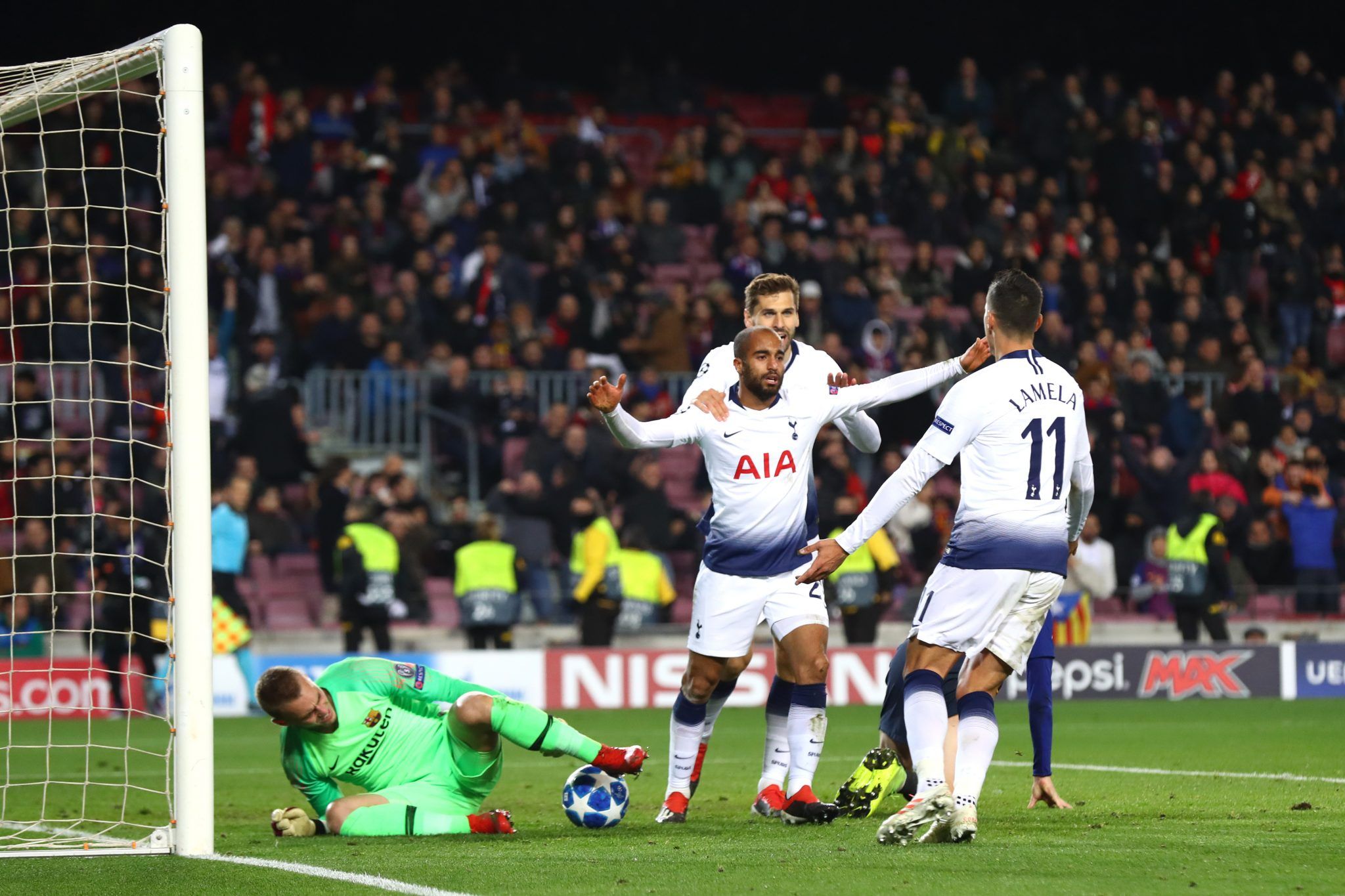 But Spurs still had an agonising wait after the final whistle.
They huddled in the dressing room to discover Inter’s result against PSV, which they needed to match or better.
Those two minutes felt like an age, but then came the relief: it ended 1-1 in Milan just as it did in Barcelona. Spurs, against all convention, were through.
“We showed that all is possible in football if you have the belief,” said Pochettino, who handed Kyle Walker-Peters a Champions League debut with Kieran Trippier and Serge Aurier both injured.
The 22-year-old was at fault for Dembele’s opener, was booked after 15 minutes, but then grew into the fixture and produced a crucial block to deny Philippe Coutinho a certain goal that would have been catastrophic for Tottenham.
In a game of such magnitude, against the most illustrious of opponents, Pochettino could have opted for the safer approach of starting Eric Dier on the right flank or reduce the risk at half-time by introducing him to the fold.
But he persisted with Walker-Peters, telling him how he recovered from his mistake was way more significant than the error itself. The manager was also enthused by the on-field coaching of Danny Rose and Kane.
The former encouraged Walker-Peters to shake it off and keep going before the Spurs captain reminded him that there’s still plenty of time in the game to not only atone, but be an instructive part of a historic result.
Pochettino’s faith is “contagious” - as one staffer described it - and it was no surprise to see his players parroting the phrases he had fed them through their tribulations during their feeling of triumph post-match at Camp Nou.
“It looked like we were down and out,” said Kane, “but we kept fighting, we didn’t give up against PSV, Inter or against Barca” with Lloris adding “we stuck to our principles” and Eriksen rounding off the assessments by stating “we believe Spurs belong in the Champions League knockout rounds.”
But Spurs still had an agonising wait after the final whistle.
They huddled in the dressing room to discover Inter’s result against PSV, which they needed to match or better.
Those two minutes felt like an age, but then came the relief: it ended 1-1 in Milan just as it did in Barcelona. Spurs, against all convention, were through.
“We showed that all is possible in football if you have the belief,” said Pochettino, who handed Kyle Walker-Peters a Champions League debut with Kieran Trippier and Serge Aurier both injured.
The 22-year-old was at fault for Dembele’s opener, was booked after 15 minutes, but then grew into the fixture and produced a crucial block to deny Philippe Coutinho a certain goal that would have been catastrophic for Tottenham.
In a game of such magnitude, against the most illustrious of opponents, Pochettino could have opted for the safer approach of starting Eric Dier on the right flank or reduce the risk at half-time by introducing him to the fold.
But he persisted with Walker-Peters, telling him how he recovered from his mistake was way more significant than the error itself. The manager was also enthused by the on-field coaching of Danny Rose and Kane.
The former encouraged Walker-Peters to shake it off and keep going before the Spurs captain reminded him that there’s still plenty of time in the game to not only atone, but be an instructive part of a historic result.
Pochettino’s faith is “contagious” - as one staffer described it - and it was no surprise to see his players parroting the phrases he had fed them through their tribulations during their feeling of triumph post-match at Camp Nou.
“It looked like we were down and out,” said Kane, “but we kept fighting, we didn’t give up against PSV, Inter or against Barca” with Lloris adding “we stuck to our principles” and Eriksen rounding off the assessments by stating “we believe Spurs belong in the Champions League knockout rounds.”
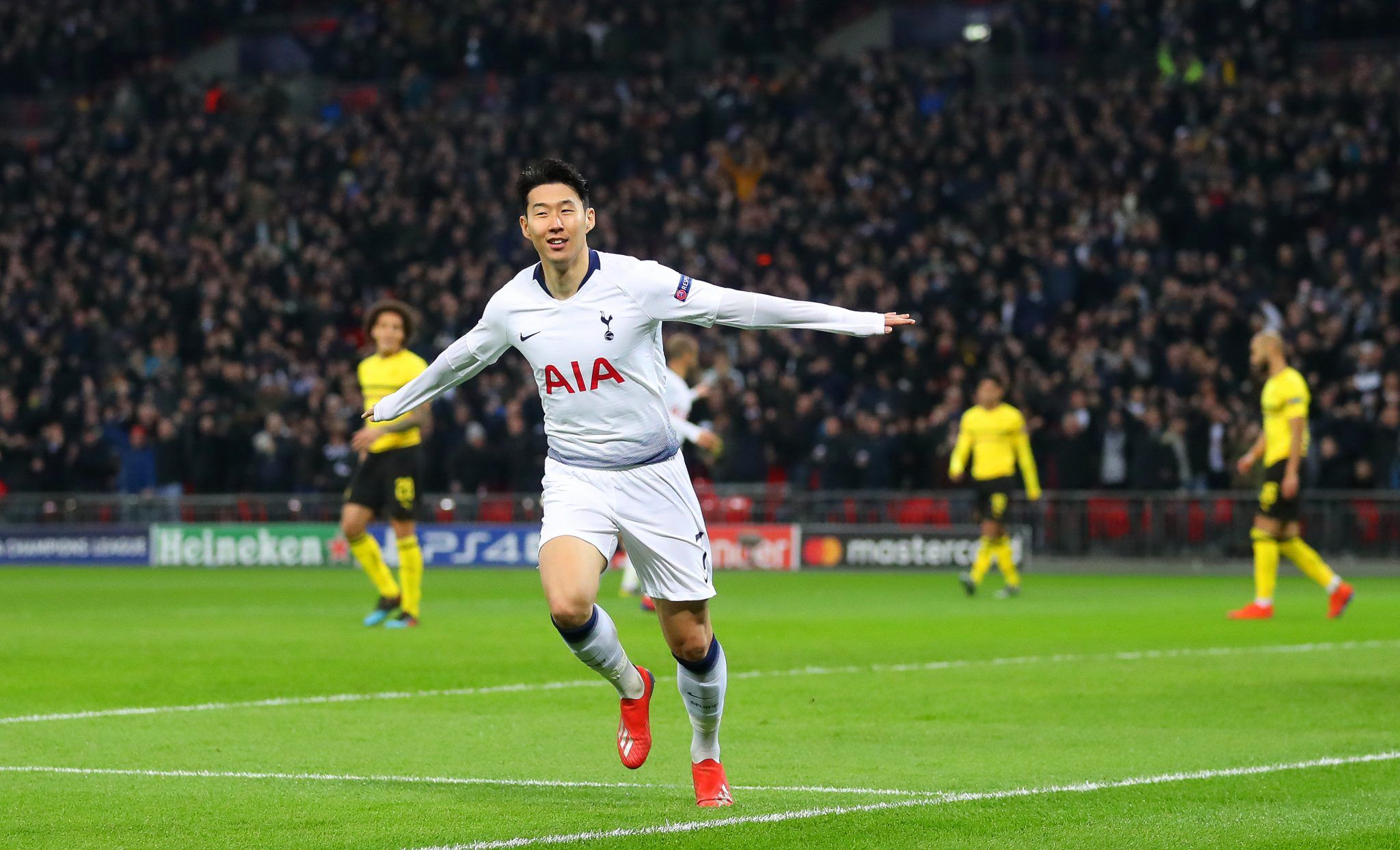 However, in the build-up to the first leg at Wembley in February, Dortmund had stuttered: dropping points at Eintracht Frankfurt, losing on penalties to Werder Bremen after a 3-3 draw in the German Cup and then blowing a 3-0 lead at home to Hoffenheim, who departed with a share of the spoils.
Lucien Favre’s side were electric, but they could also easily short-circuit under pressure.
Tottenham, without the injured Kane and Alli, suffered during a tense, tight first half but produced a masterclass after the break.
Defensively brilliant following Pochettino’s notes on their positioning without the ball during the interval, which allowed the hosts more confidence in possession, BVB were restricted to just one shot on target in the second period.
Spurs, meanwhile, converted three of the five they managed - two arriving in the closing 10 minutes.
It was the final goal, netted by Fernando Llorente just 146 seconds after he was subbed on, which was the most interesting.
Comfortable in the game by then at 2-0, and with the final whistle fast approaching, Spurs opted not to kill time with a short corner as per the norm.
Instead, Eriksen directed his delivery towards the near-post, which the striker headed in to effectively kill BVB off in the tie.
Jan Vertonghen’s effort had only been celebrated three minutes earlier on '83, with Tottenham transforming a thin margin of victory into a titanic one: the second leg would now be a formality barring an almighty collapse.
Pochettino was pleased with so many elements of the display, but most especially the autonomous decisiveness of his players.
However, in the build-up to the first leg at Wembley in February, Dortmund had stuttered: dropping points at Eintracht Frankfurt, losing on penalties to Werder Bremen after a 3-3 draw in the German Cup and then blowing a 3-0 lead at home to Hoffenheim, who departed with a share of the spoils.
Lucien Favre’s side were electric, but they could also easily short-circuit under pressure.
Tottenham, without the injured Kane and Alli, suffered during a tense, tight first half but produced a masterclass after the break.
Defensively brilliant following Pochettino’s notes on their positioning without the ball during the interval, which allowed the hosts more confidence in possession, BVB were restricted to just one shot on target in the second period.
Spurs, meanwhile, converted three of the five they managed - two arriving in the closing 10 minutes.
It was the final goal, netted by Fernando Llorente just 146 seconds after he was subbed on, which was the most interesting.
Comfortable in the game by then at 2-0, and with the final whistle fast approaching, Spurs opted not to kill time with a short corner as per the norm.
Instead, Eriksen directed his delivery towards the near-post, which the striker headed in to effectively kill BVB off in the tie.
Jan Vertonghen’s effort had only been celebrated three minutes earlier on '83, with Tottenham transforming a thin margin of victory into a titanic one: the second leg would now be a formality barring an almighty collapse.
Pochettino was pleased with so many elements of the display, but most especially the autonomous decisiveness of his players.
 He is a manager who supplies fundamental tenets, but offers the team freedom to make their own choices on the pitch. If you are not brave enough to make a mistake, you cannot be brave enough to make the difference.
Vertonghen, the man of the match, had operated as a left wing-back while Juan Foyth was a surprise pick to partner Toby Alderweireld and Davinson Sanchez in central defence, earning his first start in the competition this season.
Pochettino’s selection gymnastics have been one of the major themes on the continent as well as domestically in 2018-19 on account of a slim squad, shorn of investment, which has routinely been starved of its most influential players.
While most elite clubs identify the weaknesses of the opposition in tandem with how to underscore their own strengths before formulating a strategy and selection, Tottenham are forced to take a less flexible slant.
Before they can sketch how they want to play, the pivotal question is who is available and what solutions need to be found positionally.
Just how then has a club with a net net spend of just £29 million - without factoring in January’s outgoings - since Pochettino was appointed in 2014 make it to the quarter-finals of the Champions League despite the stadium disruptions and a full treatment room?
“Resilience” is the most common answer from those who work at the training facility in Enfield; a characteristic funnelled from a manager with a talent of recasting negatives as positives.
That magic trick would only become harder following the draw for the quarters.
He is a manager who supplies fundamental tenets, but offers the team freedom to make their own choices on the pitch. If you are not brave enough to make a mistake, you cannot be brave enough to make the difference.
Vertonghen, the man of the match, had operated as a left wing-back while Juan Foyth was a surprise pick to partner Toby Alderweireld and Davinson Sanchez in central defence, earning his first start in the competition this season.
Pochettino’s selection gymnastics have been one of the major themes on the continent as well as domestically in 2018-19 on account of a slim squad, shorn of investment, which has routinely been starved of its most influential players.
While most elite clubs identify the weaknesses of the opposition in tandem with how to underscore their own strengths before formulating a strategy and selection, Tottenham are forced to take a less flexible slant.
Before they can sketch how they want to play, the pivotal question is who is available and what solutions need to be found positionally.
Just how then has a club with a net net spend of just £29 million - without factoring in January’s outgoings - since Pochettino was appointed in 2014 make it to the quarter-finals of the Champions League despite the stadium disruptions and a full treatment room?
“Resilience” is the most common answer from those who work at the training facility in Enfield; a characteristic funnelled from a manager with a talent of recasting negatives as positives.
That magic trick would only become harder following the draw for the quarters.
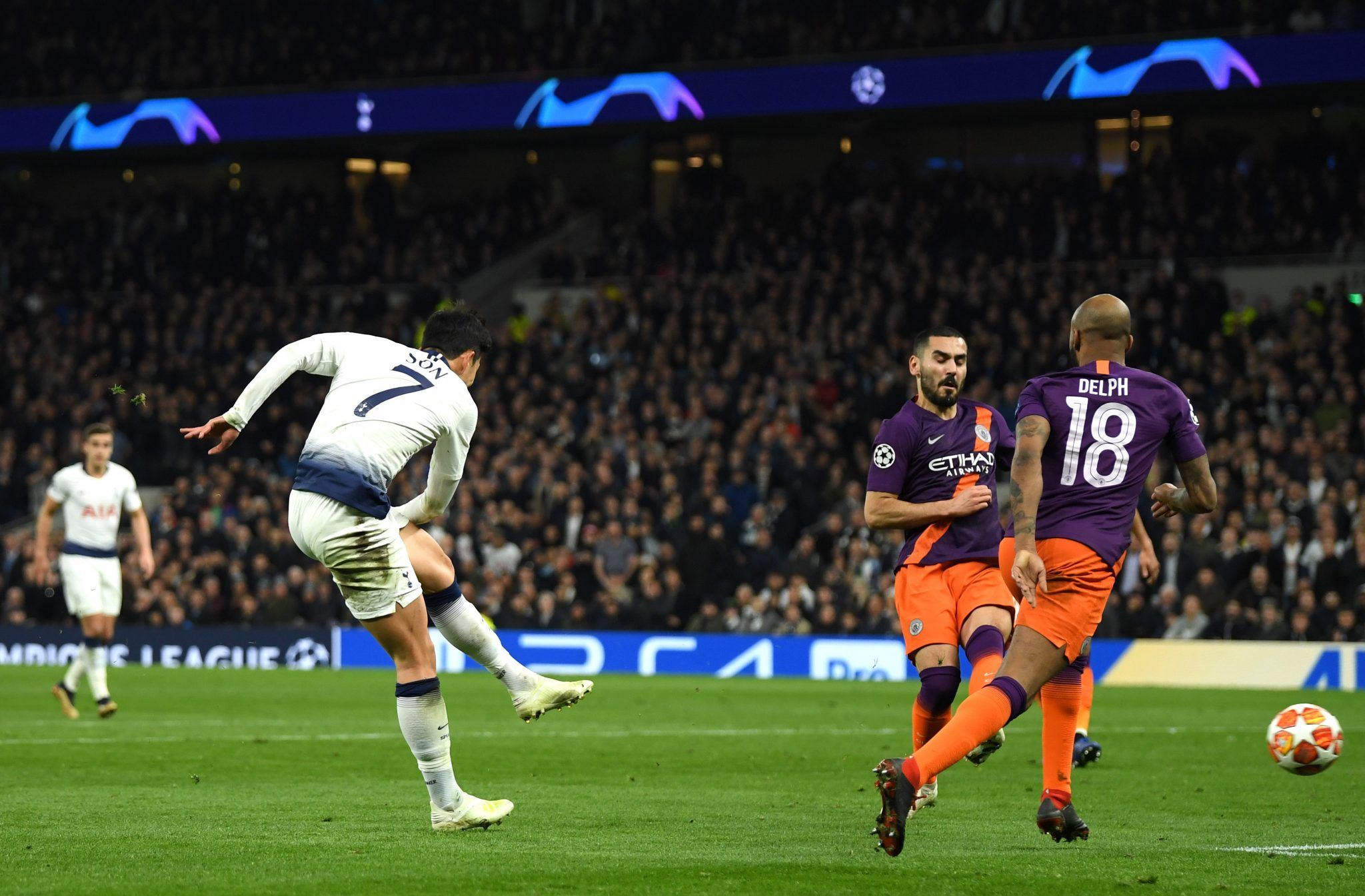 City’s 11, conservative rather than their strongest selection, did not greatly alter Tottenham’s strategy and neither did it baffle Pochettino and co, who feel it is unfair to guess why an opposing manager has made decisions without being privy to the same information.
Spurs’ analytical preparations centered largely around their past games against Guardiola’s sides: what worked, what didn’t, where they could do the most damage.
A video clip was also cut to illustrate the chances City conceded against multiple other teams, with set-pieces accentuated as a potential source of joy.
Tottenham, as the visitors expected, would be aggressive with and without the ball. They wanted to force City to run backwards - a facet high-possession teams generally struggle with - while displaying defensive courage.
Keeping a clean sheet was paramount, but 10 minutes in, that was already in jeopardy as Raheem Sterling’s shot ricocheted off Rose’s elbow and referee Bjorn Kuipers signalled that the incident was being reviewed by VAR.
Penalty!
Lloris had already saved spot-kicks against Leicester and Arsenal in 2019 and not only was he confident when facing Sergio Aguero from 12 yards out, he felt he had a psychological edge.
The France international had dived to his right for the last two penalties he thwarted and knew the striker would have been fed that information, so he successfully went to his left.
City managed just two shots on target in the encounter and their most enterprising period - after Kane was subbed off due to an ankle injury on 58 - was curtailed by Son’s winner 20 minutes later.
When the England captain was replaced, the sentiment - colouring the match commentary and social media - was that surely, there could only be one victor on the night and in the tie.
But Tottenham have acclimatised to being without their talisman over the last four years.
While they obviously miss his qualities, they adjust to a different dynamic, which Son especially thrives in.
City’s 11, conservative rather than their strongest selection, did not greatly alter Tottenham’s strategy and neither did it baffle Pochettino and co, who feel it is unfair to guess why an opposing manager has made decisions without being privy to the same information.
Spurs’ analytical preparations centered largely around their past games against Guardiola’s sides: what worked, what didn’t, where they could do the most damage.
A video clip was also cut to illustrate the chances City conceded against multiple other teams, with set-pieces accentuated as a potential source of joy.
Tottenham, as the visitors expected, would be aggressive with and without the ball. They wanted to force City to run backwards - a facet high-possession teams generally struggle with - while displaying defensive courage.
Keeping a clean sheet was paramount, but 10 minutes in, that was already in jeopardy as Raheem Sterling’s shot ricocheted off Rose’s elbow and referee Bjorn Kuipers signalled that the incident was being reviewed by VAR.
Penalty!
Lloris had already saved spot-kicks against Leicester and Arsenal in 2019 and not only was he confident when facing Sergio Aguero from 12 yards out, he felt he had a psychological edge.
The France international had dived to his right for the last two penalties he thwarted and knew the striker would have been fed that information, so he successfully went to his left.
City managed just two shots on target in the encounter and their most enterprising period - after Kane was subbed off due to an ankle injury on 58 - was curtailed by Son’s winner 20 minutes later.
When the England captain was replaced, the sentiment - colouring the match commentary and social media - was that surely, there could only be one victor on the night and in the tie.
But Tottenham have acclimatised to being without their talisman over the last four years.
While they obviously miss his qualities, they adjust to a different dynamic, which Son especially thrives in.
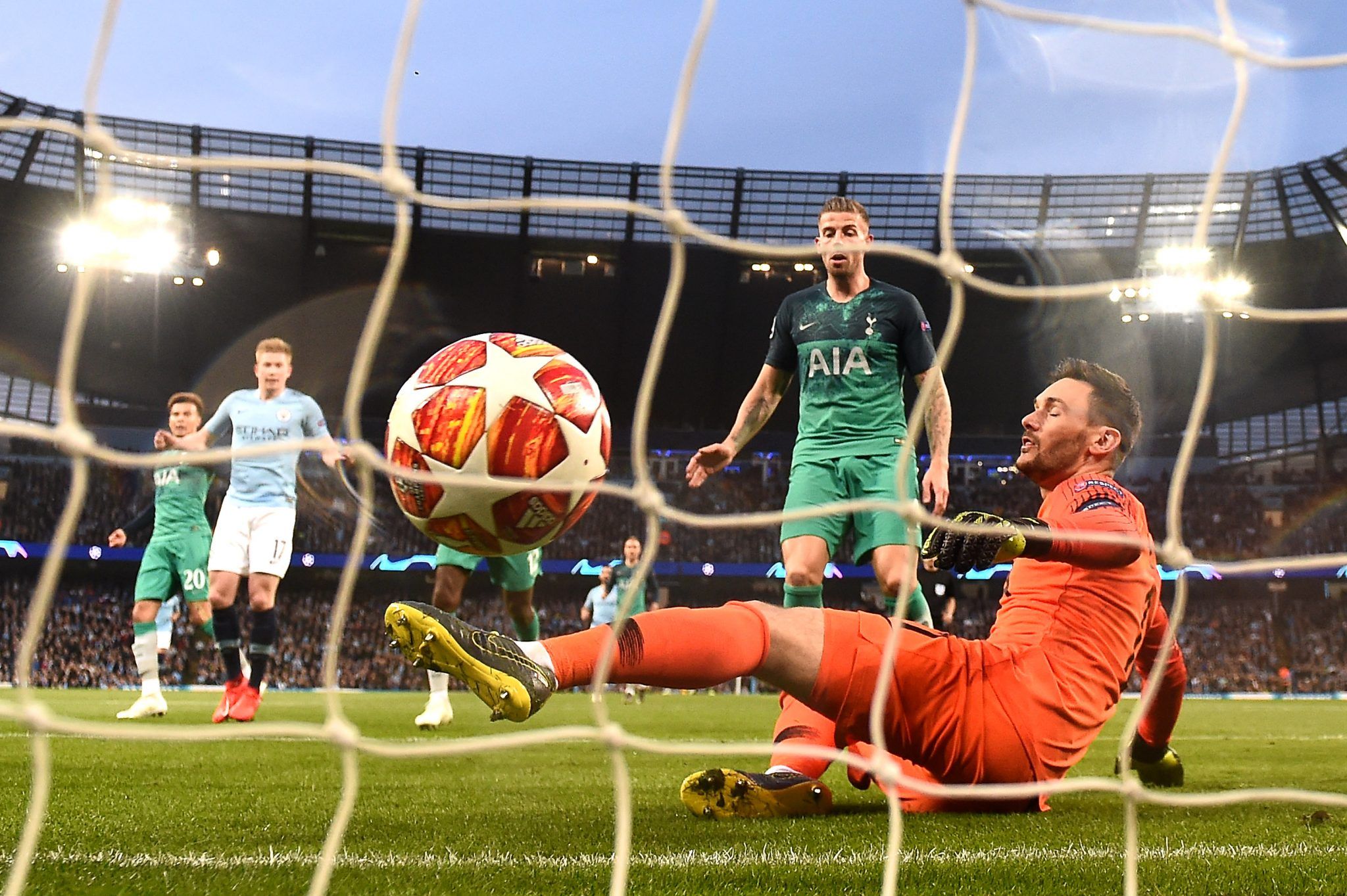 De Bruyne, the best player on the pitch, makes it that much harder for Spurs with his third assist of the night, dribbling before releasing Aguero on the wide right, who powered beyond Lloris at his near post.
59 minutes played and City finally have the comfort of a two-goal cushion. But 14 minutes later, Tottenham maximise a corner situation as per instruction: the delivery floats over Fernandinho and Kompany before striking Llorente’s hip and going in.
A VAR check. No handball. Goal!
4-4 on aggregate, advantage Spurs.
Then, the twisting torment followed by the highest exultation.
Sterling, sliding across the turf - almost out-of-body - believes he has sent City through in the most extraordinary of scenes while securing his hat-trick deep into injury time.
Guardiola, both arms in the air, jumps up and down on the touchline as the Etihad erupts.
Spurs players are on their knees, Pochettino looks to the sky.
Eriksen, guilty of losing possession in the build-up, seems to want to disappear.
But Tottenham’s assistant manager Jesus Perez, facing the pitch, notices referee Cuneyt Cakir suggest there may be an offside question to answer.
Pochettino, having freshly chucked his jacket in frustration was walking back towards his No. 2, who tells him to relax because a check is in play.
And then the words ‘VAR goal review’ thundered out of the tannoy.
Disallowed. Aguero offside.
De Bruyne, the best player on the pitch, makes it that much harder for Spurs with his third assist of the night, dribbling before releasing Aguero on the wide right, who powered beyond Lloris at his near post.
59 minutes played and City finally have the comfort of a two-goal cushion. But 14 minutes later, Tottenham maximise a corner situation as per instruction: the delivery floats over Fernandinho and Kompany before striking Llorente’s hip and going in.
A VAR check. No handball. Goal!
4-4 on aggregate, advantage Spurs.
Then, the twisting torment followed by the highest exultation.
Sterling, sliding across the turf - almost out-of-body - believes he has sent City through in the most extraordinary of scenes while securing his hat-trick deep into injury time.
Guardiola, both arms in the air, jumps up and down on the touchline as the Etihad erupts.
Spurs players are on their knees, Pochettino looks to the sky.
Eriksen, guilty of losing possession in the build-up, seems to want to disappear.
But Tottenham’s assistant manager Jesus Perez, facing the pitch, notices referee Cuneyt Cakir suggest there may be an offside question to answer.
Pochettino, having freshly chucked his jacket in frustration was walking back towards his No. 2, who tells him to relax because a check is in play.
And then the words ‘VAR goal review’ thundered out of the tannoy.
Disallowed. Aguero offside.
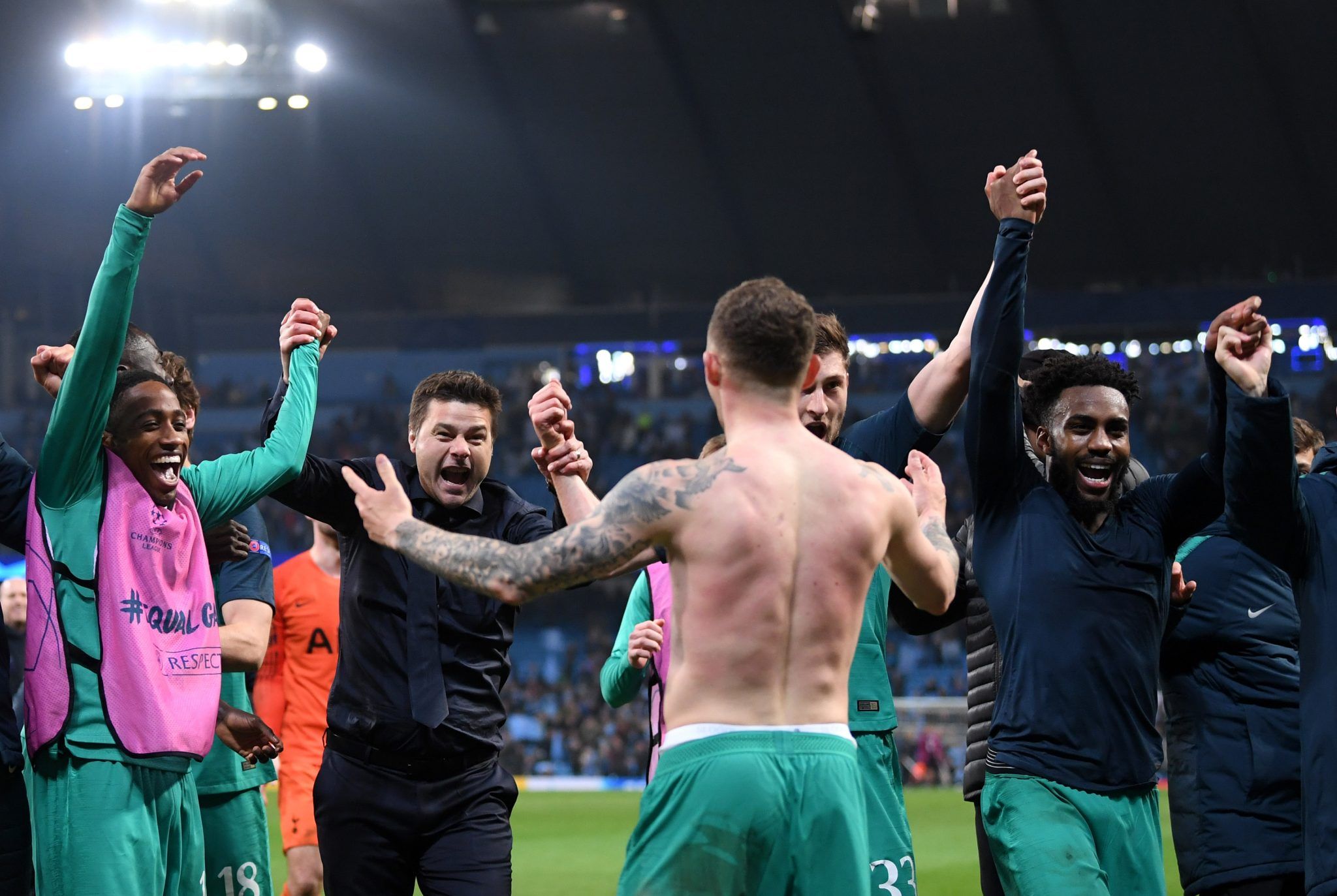 Miguel D'Agostino and the goalkeeping coach Toni Jimenez celebrated the decision, but Perez calmed them down. There was still an action or two left in a match that had so much drama, it was not inconceivable to imagine more.
When the whistle sounded, the relief poured out and prompted a 40-second explosion of emotion between Pochettino and his tactical team.
Back in the dressing room, where he earlier told his players how close they were, he was now praising their “cajones” for crossing the finishing line.
“Unbelievable,” Pochettino shouted on loop as he continued to embrace his coaches in the dressing room.
In the aftermath, there was no big speech. The manager wanted everyone to absorb the achievement in their own way; words didn’t matter when their faces told such a powerful, euphoric story.
They had done it together. Minds rewinded to the start of the season, when it became apparent that there would be no signings and Tottenham would have to resume their role of clawing for everything and catapulting themselves above reality.
Miguel D'Agostino and the goalkeeping coach Toni Jimenez celebrated the decision, but Perez calmed them down. There was still an action or two left in a match that had so much drama, it was not inconceivable to imagine more.
When the whistle sounded, the relief poured out and prompted a 40-second explosion of emotion between Pochettino and his tactical team.
Back in the dressing room, where he earlier told his players how close they were, he was now praising their “cajones” for crossing the finishing line.
“Unbelievable,” Pochettino shouted on loop as he continued to embrace his coaches in the dressing room.
In the aftermath, there was no big speech. The manager wanted everyone to absorb the achievement in their own way; words didn’t matter when their faces told such a powerful, euphoric story.
They had done it together. Minds rewinded to the start of the season, when it became apparent that there would be no signings and Tottenham would have to resume their role of clawing for everything and catapulting themselves above reality.
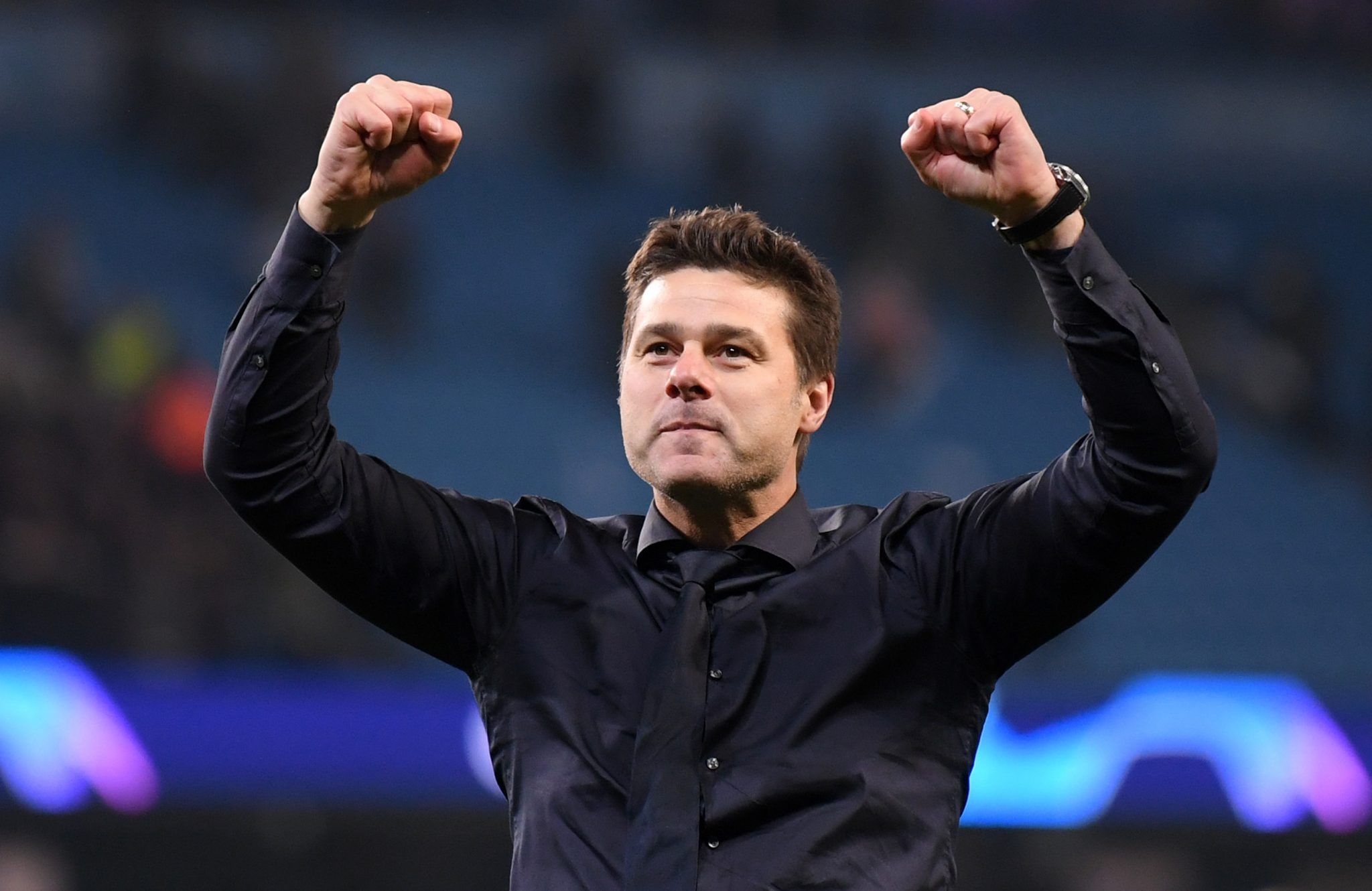 Pochettino pulled everyone in when the summer transfer window closed. ‘This is us,’ he told them. Whatever any individual wanted - himself or otherwise - was now null and void.
They would have to go again, fighting against the tide and thinking about possibilities not problems. It would be difficult, but it would also be worth it if they left it all on the line.
Now, here they were. Champions League semi-finalists.
A phenomenal achievement, but it is perhaps the biggest compliment to Pochettino’s management is that it seems normal - that some expected it and that if they didn’t overcome City, it would have been seen as great failure despite the massive mind the gap in resources.
The fairytale - founded on unwavering principles, exceptional coaching and a culture of bouncebackability - continues against Ajax, who have their own happy ending to write.
Whatever happens next, no-one can take away from Tottenham what has come before.
They dare and they do.
Pochettino pulled everyone in when the summer transfer window closed. ‘This is us,’ he told them. Whatever any individual wanted - himself or otherwise - was now null and void.
They would have to go again, fighting against the tide and thinking about possibilities not problems. It would be difficult, but it would also be worth it if they left it all on the line.
Now, here they were. Champions League semi-finalists.
A phenomenal achievement, but it is perhaps the biggest compliment to Pochettino’s management is that it seems normal - that some expected it and that if they didn’t overcome City, it would have been seen as great failure despite the massive mind the gap in resources.
The fairytale - founded on unwavering principles, exceptional coaching and a culture of bouncebackability - continues against Ajax, who have their own happy ending to write.
Whatever happens next, no-one can take away from Tottenham what has come before.
They dare and they do.
Explore more on these topics: